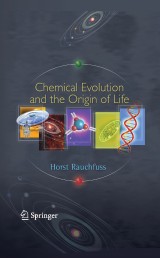Details

Chemical Evolution and the Origin of Life
|
128,39 € |
|
| Verlag: | Springer |
| Format: | |
| Veröffentl.: | 15.10.2008 |
| ISBN/EAN: | 9783540788232 |
| Sprache: | englisch |
| Anzahl Seiten: | 339 |
Dieses eBook enthält ein Wasserzeichen.
Beschreibungen
How did life begin on the early Earth? We know that life today is driven by the universal laws of chemistry and physics. By applying these laws over the past ?fty years, en- mous progress has been made in understanding the molecular mechanisms that are the foundations of the living state. For instance, just a decade ago, the ?rst human genome was published, all three billion base pairs. Using X-ray diffraction data from crystals, we can see how an enzyme molecule or a photosynthetic reaction center steps through its catalytic function. We can even visualize a ribosome, central to all life, translate - netic information into a protein. And we are just beginning to understand how molecular interactions regulate thousands of simultaneous reactions that continuously occur even in the simplest forms of life. New words have appeared that give a sense of this wealth of knowledge: The genome, the proteome, the metabolome, the interactome. But we can’t be too smug. We must avoid the mistake of the physicist who, as the twentieth century began, stated con?dently that we knew all there was to know about physics, that science just needed to clean up a few dusty corners. Then came relativity, quantum theory, the Big Bang, and now dark matter, dark energy and string theory. Similarly in the life sciences, the more we learn, the better we understand how little we really know. There remains a vast landscape to explore, with great questions remaining.
How did life begin on the early Earth? We know that life today is driven by the universal laws of chemistry and physics. By applying these laws over the past ?fty years, en- mous progress has been made in understanding the molecular mechanisms that are the foundations of the living state. For instance, just a decade ago, the ?rst human genome was published, all three billion base pairs. Using X-ray diffraction data from crystals, we can see how an enzyme molecule or a photosynthetic reaction center steps through its catalytic function. We can even visualize a ribosome, central to all life, translate - netic information into a protein. And we are just beginning to understand how molecular interactions regulate thousands of simultaneous reactions that continuously occur even in the simplest forms of life. New words have appeared that give a sense of this wealth of knowledge: The genome, the proteome, the metabolome, the interactome. But we can’t be too smug. We must avoid the mistake of the physicist who, as the twentieth century began, stated con?dently that we knew all there was to know about physics, that science just needed to clean up a few dusty corners. Then came relativity, quantum theory, the Big Bang, and now dark matter, dark energy and string theory. Similarly in the life sciences, the more we learn, the better we understand how little we really know. There remains a vast landscape to explore, with great questions remaining.
Historical Survey.- The Cosmos, the Solar System and the Primeval Earth.- From the Planets to Interstellar Matter.- “Chemical Evolution”.- Peptides and Proteins: the “Protein World”.- The “RNA World”.- Other Theories and Hypotheses.- The Genetic Code and Other Theories.- Basic Phenomena.- Primeval Cells and Cell Models.- Exo/Astrobiology and Other Related Subjects.
<P>Up to now, we do not have a generally accepted theory about the origin of life and about the process of development of life, we only have a great number of - to some extent even contradictory – hypotheses. Meanwhile there came up some scientific findings beyond thought only a few years ago. </P>
<P>Horst Rauchfuss is comparing the different theories from the view of the latest results and is giving an exciting and easy understandable insight into the present state of research. </P>
<P>Horst Rauchfuss is comparing the different theories from the view of the latest results and is giving an exciting and easy understandable insight into the present state of research. </P>
<p>Critical assessment of the different theories and hypotheses about the origin of life based on the latest scientific findings</p><p>Exciting and easily understandable presentation suitable for researchers in all fields as well as for interested lay people</p><p>A "must" for chemists, biochemists, and biologists!</p><p>Includes supplementary material: sn.pub/extras</p>
Diese Produkte könnten Sie auch interessieren:

Proceedings of the 2007 National Conference on Environmental Science and Technology

von: Godfrey Uzochukwu, Keith Schimmel, Shoou-Yuh Chang, Vinayak Kabadi, Stephanie Luster-Teasley, Gudigopuram Reddy, Emmanuel Nzewi

149,79 €















